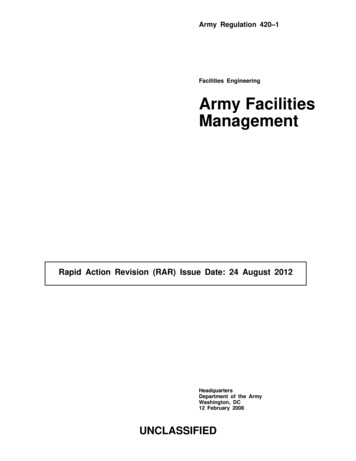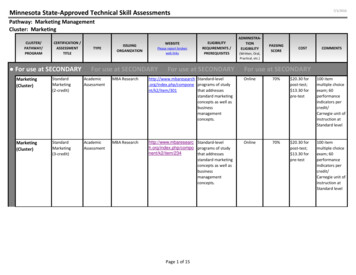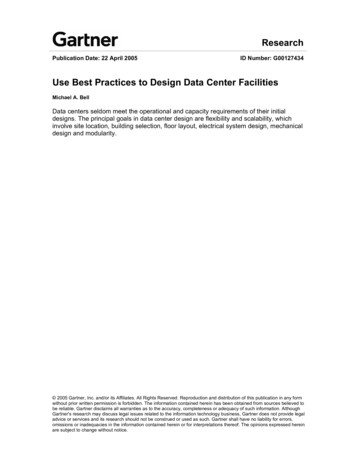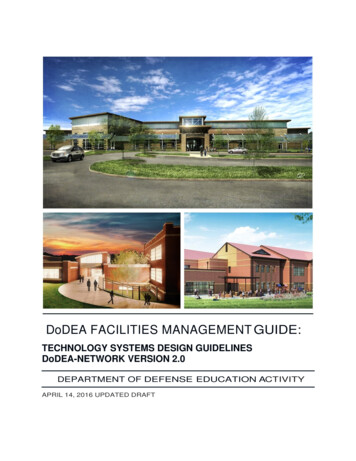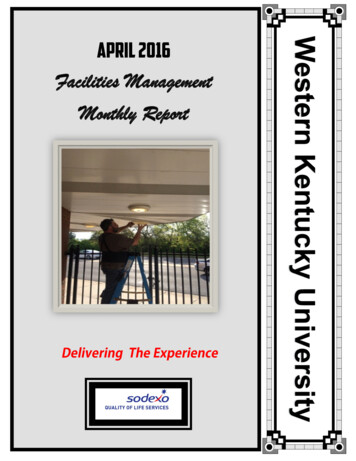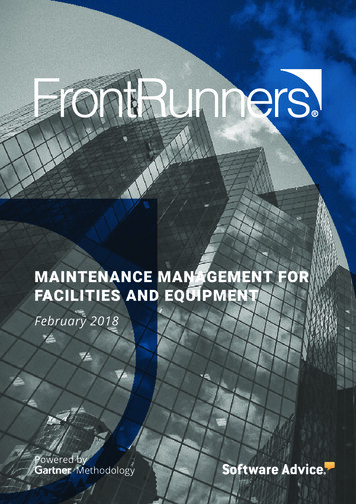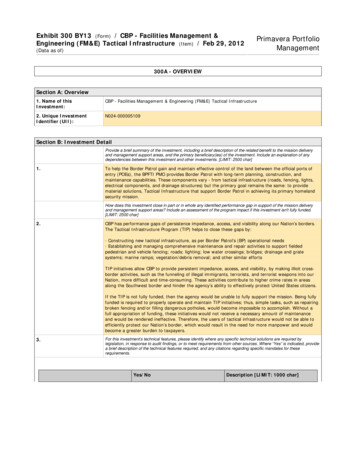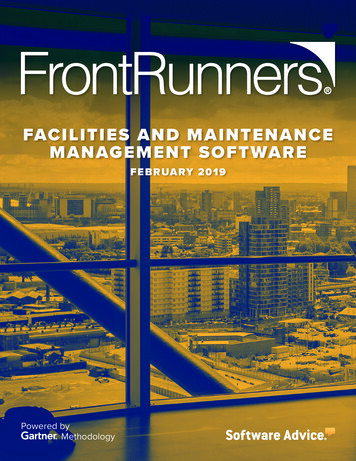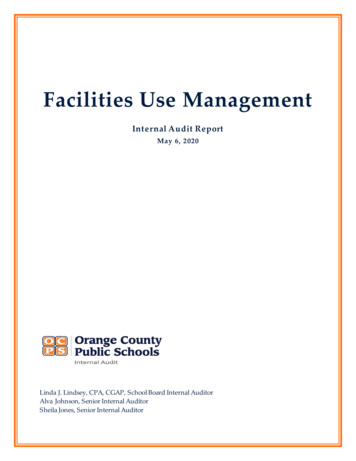
Transcription
Facilities Use ManagementInternal Audit ReportMay 6, 2020Linda J. Lindsey, CPA, CGAP, School Board Internal AuditorAlva Johnson, Senior Internal AuditorSheila Jones, Senior Internal Auditor
Table of ContentsPage NumberEXECUTIVE SUMMARY1DEFINITIONS2BACKGROUND3OBJECTIVES, SCOPE, AND METHODOLOGY3RESULTS AND RECOMMENDATIONS5
Facilities Use ManagementInternal Audit ReportEXECUTIVE SUMMARYWh y We Did Th is Au ditResu lts an d Recommen dationsManagement requested this audit due to the impending outsourcing of facilities use managementsoftware provider ended, so did access to 16from district staff to a vendor. We last auditedyears of OCPS data for facilities users.Facilities Use Management (FUM) in 2014, andmanagementnotedthatanumberNote: A new provider for Facilities Use hasofrecommendations from that audit have not beenaddressed.When the contract with the previousbeen selected to replace the previous vendor. 1.3 million in unpaid facilities use fees areover 75 days in arrears and some users havebeen allowed to continue using facilities evenOur objectives were to evaluate FUM’s effectiveness,efficiency, and internal controls to assist thedepartment in managing its transition to outsourcedmanagement and to evaluate compliance withthough they have not paid prior fees. 2004 have not been written off. applicable laws and regulations as well as districtpolicies. We were also asked to analyze utility feeUtility rates for users should be increased tocover actual costs. In-kind (third party donation of goods andservices beneficial to the Board in lieu of fees)This audit was included in the 2019-2020 AnnualAudit Plan.Two issues from the 2014 audit have not beenaddressed. rates as compared to utility costs and to evaluate thelarge amount of unpaid facilities use fees.Uncollectible amounts going back as far asapplications were deficient for two users. Payments forfacilitiesusewerenotsubmitted timely to the Finance department. O bser v ations an d Con clusionScorecard data showed a recording error of 10,000.Audit Results at a GlanceRisk / Impact RatingResults and ObservationsSourceIA - Internal Audit orM - ManagementObservation CategoryD - Deficiency orO - OpportunitySignificantModerateMinorIA - 1M-2IA - 2M-0IA - 2M-0D-3D-2D-2This report has been discussed with management andthey have prepared their response which follows.Two items in the table above are repeated from our2014 audit. Due to a scope limitation we are unable toexpress an overall conclusion. However, from theprocedures we performed we have identified severalareas of risk that should be addressed as described inthe next section.Page 1 of 10
Facilities Use ManagementInternal Audit ReportDEFINITIONS:Risk / Impact RatingsMinorModerateSignificantLow risk with a financial impact of less than onepercent and/or an isolated occurrence limited to localprocesses (low impact and low likelihood)Slight to moderate risk with a financial impact betweenone and five percent and/or a noticeable issue that mayextend beyond local processes (low impact and highlikelihood or high impact and low likelihood)High risk with a financial impact greater than fivepercent and/or a significant issue that occurs inmultiple processes (high impact and high likelihood)Observations CategoriesDeficiencyOpportunityA shortcoming in controls or processes that reducesthe likelihood of achieving goals related to operations,reporting and complianceA process that falls short of best practices or does notresult in optimal productivity or use of resourcesCriteria for Observations from Management Internal audit was informed of the issue prior to startingdetailed testing Management identified, evaluated, and communicated the issue to appropriate levels of the districtManagement has begun corrective action with clear,actionable plans and targeted completion datesTwo observations in this report were identified by management.They are related to the adequacy of utility fee charges as comparedto utility costs and the large amount of unpaid facilities use fees.Page 2 of 10
Facilities Use ManagementInternal Audit ReportBACKGROUND:Management requested this audit due to the impending outsourcing offacilities use management from district staff to a vendor. We lastaudited Facilities Use Management (FUM) in 2014, and managementnoted that a number of recommendations from that audit have not beenManagement requestedthis audit.addressed.The FUM department is responsible for overseeing access to districtfacilities by community groups and governmental agencies. Until veryrecently, the department facilitated this access with the help of a cloudbased software program called Dude Solutions. According to a feestructure established by the School Board, customers are categorized byFUM oversees access todistrict facilities byoutside organizations.user group and charged usage fees. The School Board approved theuser group codes, usage fee schedules and procedures for communityuse and access to school facilities by resolution on January 11, 2005.School Board Policy KF, updated on June 11, 2019, provides guidingprinciples for use of school board facilities by the public.The FUM department works in conjunction with the administrators ofeach OCPS facility or school site. In their oversight role, FUM staff trackMost revenue fromfacility use, invoicing and payments. Most of the revenue collected foruse of school facilities stays at the school for its use. Only chargesretained at the schools.facilities use fees isintended to recover costs such as utilities and custodial services, arerecorded at the district level.During the audit period of July 1, 2018 through December 31, 2019, 7,859,124 was collected for 49,410 scheduled events. However, anadditional 947,117 in billed fees for this period were not collected asdiscussed more fully later in this report.The district collected 7,859,124 for 49,410events during the auditperiod. An additionalamount of 947,117 of feesOBJECTIVES, SCOPE AND METHODOLOGY:for this period was unpaid.ObjectivesOur objectives were to evaluate FUM’s effectiveness, efficiency, andinternal controls to assist the department in its transition to outsourcedWe were asked to analyzemanagement and to evaluate compliance with applicable laws andutility fee rates ascompared to utility costsregulations as well as district policies. We were also asked to analyzeand to evaluate the largeutility fee rates as compared to utility costs and to evaluate the largeamount of unpaid facilities use fees.amount of unpaid fees.Page 3 of 10
Facilities Use ManagementInternal Audit ReportScopeThis audit was planned to cover all activities of the department fromJuly 1, 2018 through December 31, 2019. However, just after the auditbegan, the district switched from district staff using Dude Solutions toOur scope was limitedoutsourced management with a vendor named Facilitron. Shortly afterwhen department recordsthis change in management, the district lost access to all its informationwith the cloud serviceprovider were notregarding facilities rentals, documentation, fees and collections,contained in Dude Solutions. This prevented us from performingaccessible.certain of our procedures. As a result we are unable to form an overallopinion regarding our audit objectives and instead have reported onlyon the results of those procedures we were able to perform.MethodologyOur audit was conducted in accordance with the International Standardsfor the Professional Practice of Internal Auditing of the Institute of InternalAuditors and included such procedures as deemed necessary toprovide reasonable assurance regarding the audit objective, except forthe scope limitation noted above. Internal Auditing is an independent,objective assurance and consulting activity designed to add value andimprove an organization’s operations. It helps an organizationThis audit was conductedin accordance with theInternational Standardsfor the ProfessionalPractice of InternalAuditing.accomplish its objectives by bringing a systematic, disciplinedapproach to evaluate and improve the effectiveness of riskmanagement, control, and governance processes.Our methodology for this audit included: Reviewing department processes and proceduresReviewing OCPS policies and Florida StatutesExamining information from the Dude Solutions software aboutscheduled events and reports 1Verifying data files and department reports1Interviewing members of managementWe are required to note any material deficiencies in accordance withFlorida Statutes, School Board Policy and sound business practices. Wealso offer suggestions to improve controls or operational efficiency andeffectiveness.Our ability to perform these steps was limited because records were not available.1Page 4 of 10
Facilities Use ManagementInternal Audit ReportRESULTS AND RECOMMENDATIONS:1) District records w ere lost w hen the Dude Solutions contract wascancelled. Significant impact/ Internal AuditBest Practices:Cloud services provider contracts should include a requirement to turnover district records stored at the cloud service provider when thecontract ends.Audit Results:The cloud based software Dude Solutions, which was used to record allfacilities use events for the district, was discontinued on April 5, 2020.Dude Solutions had been used since 2004, and all data since 2004 washoused on this provider’s system. The district’s contract with DudeSolutions was a piggy-back contract from another entity and did notDistrict data was lost afterthe Dude Solutionscontract ended.contain a provision requiring that records be turned over to thecontracting organization when the contract ends.The types of data and documents stored on Dude Solutions included: User contact informationUser event paymentsScheduled events, cancelled eventsInvoiced amounts and account balancesIn-kind credit informationLiability insurance documentationDuplicates of these records were not maintained in office files or onoffice computers. Now they are not available should a public recordsrequest be received, or should district staff have need of thisinformation to research past transactions. Staff downloaded some filesRecords are not availablefor research or in case of apublic records request.prior to the contract’s end, but files that were not downloaded are notaccessible.Page 5 of 10
Facilities Use ManagementInternal Audit ReportRecommendation:The District should explore options for obtaining its data from thevendor. Future contracts should contain provisions that protect theDistrict against loss of data and give recourse for such events.2) The district is ow ed almost 1.4 million in unpaid fees and the FUMDepartment has not enforced prepayment of fees, security deposits orlate fees. – Repeat findingSignificant risk / ManagementBest Practices:Fees billed should be collected on time to ensure schools and the districtare paid for the use of their facilities. New users and current users whohave not paid their bills on time should prepay fees or pay a securitydeposit as provided for in the department’s procedures. School BoardPolicy KF - Use of Facilities & School Board Property includes provisionSchool Board Policy KFaddresses use of facilitiesand School Boardproperty.to deny use of Board property until outstanding balances are paid.Uncollectible amounts should be written off in accordance with SchoolBoard Policy.Audit Results:We noted that facilities users were allowed to continue using districtfacilities even when their accounts were unpaid. At March 15, 2020, 659agencies and organizations owed the district 1,389,302 for events heldat district facilities. Ten of these organizations owe the district between 9,800 and 35,000 each, and one has been allowed to continue bookingreservations even though they have not paid for their past use of districtfacilities. The department has not written off its uncollected debts.Published FUM procedures require first time users to pre-pay fees twodays prior to their event and users with long-term agreements to pay 14days prior to their event. These procedures also include requirementsfor security deposits, late fees and cancellation fees. In our 2014 auditwe recommended that the department implement these procedures, butthey have not done so.659 organizations owe thedistrict almost 1.4million.Ten organizations owebetween 9,800 and 35,000 each.The department has notimplemented itsprocedures forprepayments, securitydeposits or late fees.Page 6 of 10
Facilities Use ManagementInternal Audit ReportThe chart below shows the accumulated unpaid fees by fiscal year from2004 to March 15, 2020 with a noticeable increase over the past threeyears. 450,000UNPAID FACILITIES USE FEES 420,018 400,000 347,530 350,000 300,000The amount of unpaid feeshas increased significantlyover the past three years. 264,701 250,000 179,569 200,000 150,000 100,000 50,000 35,867 38,738 27,596 10,181 23,467 41,636The department has notwritten off uncollectibleaccounts. 0Facilities use fees are retained by the schools and used for extraexpenses. Unpaid fees result in fewer dollars available to the schools.Recommendation:As in our 2014 audit, we recommend that organizations with unpaidbalances greater than 30 days not be allowed to use facilities until theirfees are paid. Advance deposits should be collected from continuingusers who have not paid their fees on time to protect against bad debts.If these measures had been used, the large amount of unpaid fees couldhave been avoided and these monies would be available to the schools.After all collection efforts have failed, uncollectable amounts should bewritten off in accordance with School Board Policy.The district should notallow organizations withunpaid fees to continue touse its facilities.Uncollectible amountsshould be written off.Page 7 of 10
Facilities Use ManagementInternal Audit Report3) Utility Rates should be adjusted to cover the district’s actual costs.Significant impact / ManagementBest Practice:In order to avoid the district incurring an expense due to outsideorganizations using its facilities, fees charged for utilities should coverthe district’s utility costs associated with facility usage.Audit Result:The Energy Advisors Department has documented increases from 9%to 25% in utility costs since the last fee update in 2017. Their analysisindicates that the fees charged are not enough to cover the utility costsincurred by users of district facilities.According to the EnergyAdvisors Department,utility charges to facilitiesusers do not cover currentutility costs.Recommendation:To ensure that the district does not lose money due to utility costsincurred by facility users, management should periodically review andupdate the utility rates charged to facility users. The Energy AdvisorsFees for utilities shouldcover the district’s costs.Department prepares reports on energy costs for the district that shouldbe referenced during these reviews. The rates charged to facility usersshould cover the district’s costs.4) Payments were not submitted timely to the Finance Department.Moderate risk / Internal AuditBest Practice:To reduce risk of loss, checks received by departments should be sentto the Finance department within 24 – 48 hours of receipt. Until sent toFinance, the payments should be protected from loss and duplication.Audit Result:We noted that checks received by mail may be held for several days ina locked file at FUM offices until they are taken downtown to theFinance department.Checks are held at FUMuntil someone can takethem downtown to theFinance Department.Page 8 of 10
Facilities Use ManagementInternal Audit ReportRecommendation:Payments should be submitted to the Finance department within therequired period. This would eliminate the need to keep these checks inthe FUM office for an extended period of time.5) Documentation for tw o users’ in-kind credits w as deficient.Moderate risk / Internal AuditBest Practice:Comply with School Board Policy.Audit Result:School Board Policy KF (4) Waiver of Rental Charges (b) states: “ thirdparty users may submit an application to provide goods and servicesbeneficial to the Board or a school in lieu of fee payment,” and Section(4) (c) states: “The justification for any waiver of fees or approval of in-In-kind goods and servicescan be used to reduce feecharges.kind exchange shall be properly documented by a Cabinet level staffmember or their designees.”Two organizations did not comply with the policy for in-kind donationcredits. One organization did not have a properly approved applicationand the other organization’s paperwork could not be found.Two organizations’ inkind applications weredeficient.Recommendation:Organizations must provide proper documentation to be approved forin-kind credits and the application must be signed by a cabinet levelstaff member in accordance with School Board Policy KF.6) User groups and priority ranking should be clarified. – RepeatfindingMinor risk / Internal AuditBest Practice:User groups and priority rankings should be adequately defined toensure equitable and consistent access to use of district facilities.Audit Result:User group category definitions and priority rankings have not beenTo ensure the districtschool groups receive firstpriority for use of districtfacilities, the user groupsshould be clearly defined.determined. The definition of User Group 1 does not clearly define whoPage 9 of 10
Facilities Use ManagementInternal Audit Reporthas priority when both an OCPS school group and a community groupwant to use the same school facility at the same time. In our previousaudit we identified a situation where a community group without anapproved Facility Use Agreement was given priority over an OCPSschool group. Both groups were in User Group 1. Our recommendationfrom that audit has not been implemented.This is a repeat findingthat has not beenaddressed since our prioraudit.Recommendation:Management should review the user group categories and establish apriority of use for district locations. Those user groups that are nolonger relevant can be eliminated and new ones can be added.7) Scorecard data did not always agree w ith underlying records.Minor risk / Internal AuditBest Practice:When scorecard information is gathered, its supporting documentationThe department’sscorecards did not alwaysagree with underlyingrecords.should be retained.Audit Result:Some totals on the scorecards were different when the reports were runfor the audit. There was a 10,000 difference in Extended Day receiptsfor May 2019. This may have been an error in recording the data. ThereWe noted a 10,000difference in ExtendedDay receipts.were also differences noted in the number of events without signedagreements and in-kind totals.Recommendation:Scorecard supporting documentation should be retained to validateending report totals. This step would help to authenticate themanagement report.Documents to supportreported amounts shouldbe retained.We would like to thank the staff and management of the Facilities UseManagement Department for their cooperation and assistance duringthis audit.Page 10 of 10
AUDIT RESPONSE MATRIXDepartment / School NameAdministrator / Department HeadCabinet Official / Area SuperintendentAudit Result / RecommendationFISCAL PERIOD OR AUDIT DATE:Facilities Use ManagementHarold Jenkins, Facilities Director Real Estate ManagementJohn Morris, Chief Facilities OfficerManagement ResponseAcknowledgement/ Agreement ofConditionResponsiblePerson(Name &Title)And TargetCompletionDate(MM/YYYY)Management’s Action Plan1District records were lost when theDude Solutions contract wascanceled.The District’s facility use/rental history wasprovided by Dude Solutions on Excelspreadsheets. It will take some time formanagement to review and decipher theinformation contained thereon so that theinformation is understandable.N/AREM has reached out to Dude Solutions forinformation and guidance in deciphering theinformation
based software program called Dude Solutions. ccording to a fee A structure established by the School Board , customers are categorized by user group and charged usage fees. The School Board approved the user group codes, usage feeschedules and procedures for community use and acces
